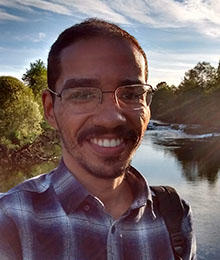An interview with Bruno Francesco Rodrigues de Oliveira
January, 2020
Bruno Francesco Rodrigues de Oliveira is a PhD student at the Federal University of Rio de Janeiro in Brazil and a member of the Microbiology Society. In this interview, he tells us more about his research which includes investigating the CAZoma of a Pseudoalteromonas sp. strain isolated from a Brazilian sea sponge.

Tell us a little about your research.
The main focus of my PhD project is to exploit the diversity and biotechnological potential of the bacterial communities associated with different life stages of a Brazilian sponge, whose species have just been identified. Currently, the main aim of the project is to investigate the CAZoma of a Pseudoalteromonas sp. strain isolated from this sponge, particularly regarding its capacity to degrade marine polysaccharides (MP). After wide-ranging enzymatic screening and genome mining, we were able to detect agarases and alginate lyases genes, which are being cloned for further heterologous expression and biochemical characterization.
Why is this research important?
Marine microbial biocatalysts are being recognized as the next frontier in the enzymology research, mainly due to their unique habitat-related properties, such as thermostability, pH resistance, halotolerance and barophilicity – ideal for a myriad of industrial settings. Among those, enzymes active on marine polysaccharides, mainly the ones derived from the algae cell wall, attract considerable attention to the biorefinery and biopharmaceutical sectors; in this last case, because the hydrolysis products are high value-added and can exhibit a wide range of therapeutically relevant activities.
Despite active research on enzymes derived from a variety of marine habitats, little effort has been conducted to study the MP-degrading repertoire of sponge microbial symbionts, even with their well-known contribution of this microbiome in the marine carbon cycle. Therefore, I have been targeting the cultivable bacterial strains isolated from this sponge in the hope we find new biocatalysts.
Why does microbiology matter?
From elucidating the origin of life to providing alternatives to make our planet more sustainable, microbiology is the most fascinating way to understand and preserve ourselves through the eyes of the invisible.
Why did you join the microbiology Society?
I have never been a member of an academic society and I was willing to be part of one for quite a long time. After hearing so many compliments from my labmates and supervisors about the Microbiology Society, I decided to join the Society and so far I am really satisfied and amazed by the excellent work it carries out.
Your abstract has been accepted and you will be presenting at the Annual Conference in Edinburgh. How do you feel about presenting and being a part of our biggest ever conference?
I am really happy about it since it is just the second time I am presenting my academic work at an international scientific event! The oral presentation is going to be a huge challenge, but I hope to succeed and to personally expand my networking at a conference where so many renowned scientists in my field will be present.


